Student Learning Assessment
Student Learning Assessment
Assessment at UA Cossatot is a faculty-driven process. Faculty are involved in every step of the assessment process. The primary goal of CCA assessment is to improve curriculum design and graduate well-rounded students who have the potential to achieve their learning and career goals. To achieve its assessment goals, the College collects assessment performance data and uses it to make changes in the curriculum. CCA assessment at UA Cossatot is tied directly to the institution’s mission to improve the lives of those in our region by providing quality education.
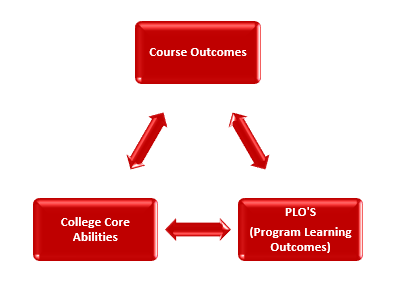
College Core Abilities
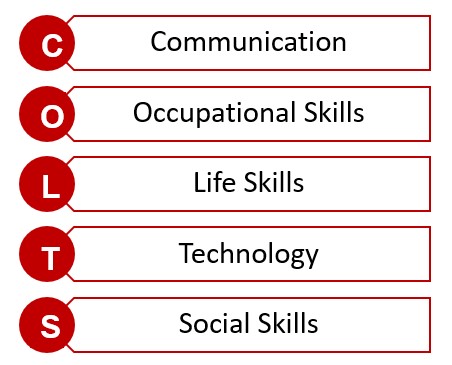 The core abilities represent the college learning outcomes (CCAs).
The core abilities represent the college learning outcomes (CCAs).
- The Communication core ability includes skills such as reading, writing, speaking, citations, and teamwork.
- The Occupational Skills core ability consists of safety and employability skills and encompasses pertinent occupation-specific skills.
- The Life Skills core ability measures student learning in the areas of leadership, problem solving and critical thinking.
- The Technology core ability includes all technological skills that students use for learning, including but not limited to microscopes, computers (hardware, software), calculators, and industry specific tools.
- The Social Skills core ability comprises social responsibility, public issues, academic integrity, and ethics.
Curricular Assessment Process
The Assessment Chairs oversee the assessment process and guide faculty and administration in a three-year assessment cycle.
Faculty, Division Chairs, Curriculum Committee, Assessment Chair, and CAO are responsible for ensuring current and new courses remain aligned and relevant to students, employers, and transfer institutions.
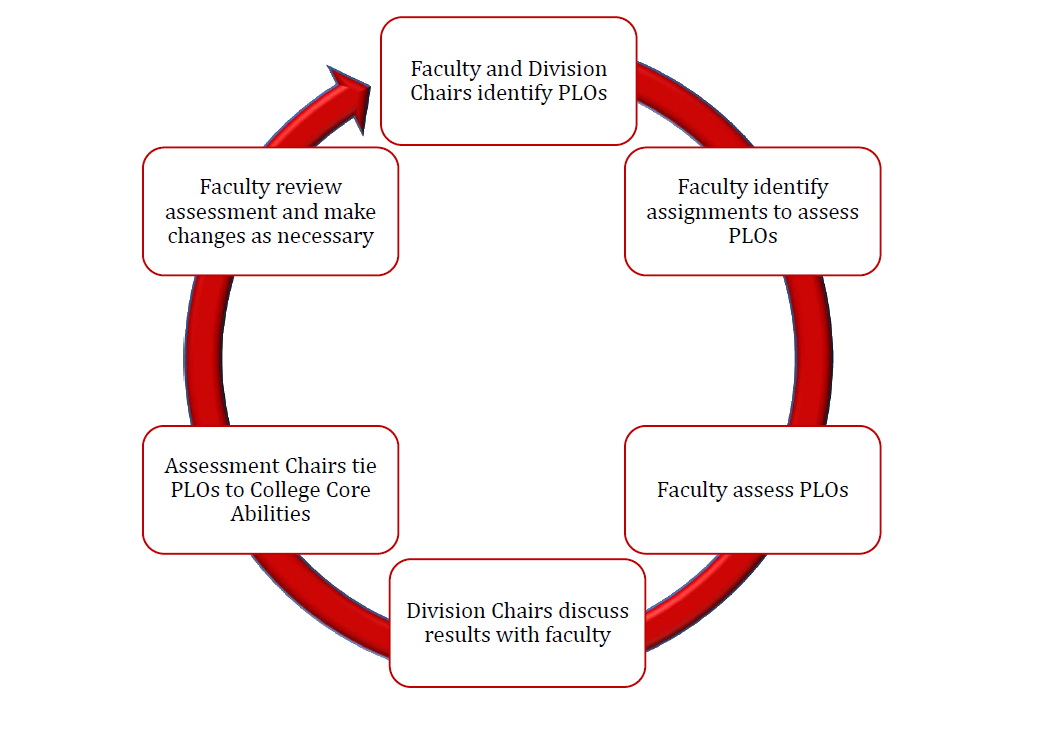
Assessment Chairs
- Sarah Chesshir, Division Chair of Professional and Technical Programs
- Crystal Sims, Division Chair of General Education and Transfer Programs
Curricular Assessment Results
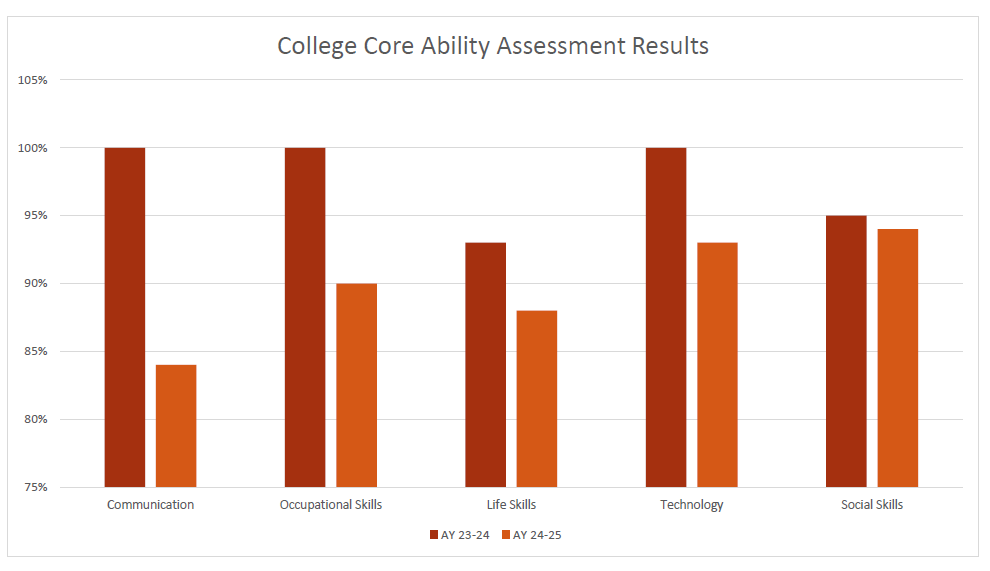
Program Learning Outcomes
Associate of Science Education / Associate of Arts in Teaching
Upon completion of the AS Education / AA Teaching program, the student will be able to
- identify attributes of an effective teacher, including establishing a positive classroom environment, maintaining student/teacher rapport, and understanding cultures and diverse backgrounds of students.
- demonstrate the application of technology used to complete activities and lesson plans.
Associate of Science Psychology
Upon completion of the AS Psychology program, the student will be able to
- understand the diversity of gender, race, social class, ethnicity, and sexuality in their own and other cultures and societies.
- use critical thinking to analyze, synthesize, and evaluate information and ideas from multiple perspectives.
Associate of Science STEM
Upon completion of the AS STEM program, the student will be able to
- demonstrate proper lab techniques and safety practices.
- apply scientific knowledge, skills, and understandings to problems and issues in daily life.
Associate of Science Criminal Justice
Upon completion of the AS Criminal Justice program, the student will be able to
- understand the diversity of gender, race, social class, ethnicity, and sexuality in their own and other cultures and societies.
- use critical thinking to analyze, synthesize, and evaluate information and ideas from multiple perspectives.
- demonstrate legal and effective practices when interacting with offenders, including juvenile offenders.
- possess a basic knowledge of criminal justice laws, requirements, and procedures.
- exemplify ethical conduct and professionalism.
Associate of Science STEM Cybersecurity/Computer Science
Upon completion of the AS STEM Cybersecurity/Computer Science program, the student will be able to
- apply needed solutions to secure computer systems and networks.
- develop and implement a cybersecurity risk management program for organizations.
- identify cybersecurity policy, ethics, and compliance for organizations.
- manage and secure cloud-based information resources.
- pass entry-level, professional cybersecurity certification exams.
Assessment Results
Program Learning Outcomes
Technical Certificate Licensed Practical Nursing (LPN)
Upon completion of the TC LPN program, the student will be able to
- apply nursing practice through accountability, legal and ethical principles, and ongoing professional development that complies with the standards of nursing practice.
- utilize critical thinking in order to provide an environment that minimizes the risk of adverse events through current evidence-based practice.
- communicate using positive interpersonal skills to convey compassion, knowledge, technology, and support quality improvement or information to diverse populations.
- serve as a member of the interdisciplinary team to provide patient-centered care to diverse populations.
Associate of Applied Science Registered Nursing (ARNEC)
Upon completion of the AAS ARNEC program, the student will be able to
- demonstrate quality and safe care that supports a culture of health through evidence-based nursing.
- apply critical thinking necessary to provide patient-centered care to diverse populations.
- collaborate with interdisciplinary team members to provide leadership in all healthcare settings.
- integrate professional nursing practice through communication, knowledge, technology, and support of quality improvement measures.
Associate of Applied Science Physical Therapist Assistant (PTA)
Upon completion of the AAS PTA program, the student will be able to
- complete all related skill checks in the PTA Skill Check Manual each semester.
- rate at beginning level by the end of the Fall I semester and intermediate level by the end of the Spring semester in communication on the Professional Behaviors Assessment Tool.
- rate at beginning level by the end of the Fall I semester and intermediate level by the end of the Spring semester in critical thinking and problem solving skills on the Professional Behaviors Assessment Tool.
- participate in research assignments that promote contemporary evidence-based physical therapy practice.
Associate of Applied Science Occupational Therapy Assistant (OTA)
Upon completion of the AAS OTA program, the student will be able to
- provide occupation-based, client-centered care that is inclusive of consumer values, beliefs and needs.
- promote health and wellbeing for individuals and populations through the use of occupation.
- apply occupational therapy interventions based on current occupational therapy principles and best practices.
- clarify and uphold the ethics, attitudes and values of the profession.
- recognize social, economic and political factors that influence and change occupational therapy services and healthcare.
- interact professionally with consumers, caregivers, families and/or professional colleagues to achieve service objectives..
- implement innovative strategies in the provision of services to individuals and populations within the community.
- demonstrate effective leadership actions within the community and within the profession.
OTA Program Evaluation Report 2023
Assessment Results
Program Learning Outcomes
Associate of Science Business
Upon completion of the AS Business program, the student will be able to:
- communicate professionally in oral and written communication.
- demonstrate the importance of ethical concepts in business practices.
- correctly apply business concepts and theories in business decision-making.
- identify and incorporate appropriate technologies to solve practical business problems and/or present data.
- apply critical thinking skills to make appropriate decisions.
- demonstrate teambuilding skills in business situations.
Associate of Science Agriculture
Upon completion of the AS Agriculture program. the student will be able to:
- demonstrate knowledge of scientific principles and emerging technologies related to agriculture.
- use knowledge and research to make informed and ethical decisions in a diverse agricultural industry.
- describe and analyze current events and issues in agriculture and how they affect the future of agricultural industries.
Natural Resources Major
Upon completion of the AS Natural Resources program. the student will be able to:
- describe basic scientific principles and applications of technology in natural resources.
- recognize how natural resource management relates to the larger environment, economy, and society.
- explain biological processes that influence ecosystems and the sustainability of natural resources.
Associate of Applied Science General Business
Upon completion of the AAS General Business program the student will be able to:
- communicate professionally in oral and written communication.
- identify ethical issues when making business decisions.
- apply critical thinking skills to make decisions.
- use technology to clearly communicate, calculate, and present concepts and data.
- apply fundamental business principles to address corporate challenges.
- solve a business problem or support a business process by using standard software.
Technical Certificate Auto/Diesel Technology
Upon completion of the TC Auto/Diesel Technology program, the student will be able to:
- apply EPA and OSHA safety standards.
- demonstrate proper techniques while performing routine inspections and preventive maintenance.
- inspect, diagnose, and repair the major systems found in current auto and diesel vehicles.
- determine the proper use of advanced diagnostic equipment commonly used in the service and repair shop.
- identify and explain the function of automotive and diesel parts and systems.
Technical Certificate Cosmetology
Upon completion of the TC Cosmetology program, the student will be able to:
- successfully pass the Arkansas State Board Cosmetology Exam.
- apply knowledge of the color wheel to perform chemical services.
- recognize skin types and skin disorders.
- demonstrate basic principles of hair analysis, haircutting, and hairstyling.
- implement safety skills relevant to the career field.
- identify business skills and activities required for the successful establishment and operation of a small business in a salon or spa environment.
Technical Certificate Industrial Electricity
Upon completion of the TC Industrial Electricity program, the student will be able to:
- identify the National Electrical Code standards and the recommended safe work practices.
- perform electrical calculations to determine voltage, amperage, and resistance using Ohm’s and Kirchhoff’s Laws.
- identify proper electrical controls used for industrial motors and equipment.
- install and wire electrical components and motors.
- troubleshoot industrial equipment using electrical schematics and proper tools.
- write and install programs to perform a variety of operations utilizing Allen Bradley PLCs and software.
Technical Certificate Industrial Technology
Upon completion of the TC Industrial Technology program, the student will be able to:
- attain knowledge of basic electrical systems.
- repair and maintain hydraulic and pneumatic systems.
- read and interpret basic blueprints, shop drawings, and electrical schematics.
- maintain and repair power transfer systems.
- demonstrate basic welding processes.
- demonstrate NCCER curriculum standards.
Technical Certificate Welding
Upon completion of the TC Welding program, the student will be able to:
- demonstrate welding safety and proper use of shop tools according to NCCER standards.
- demonstrate oxy-acetylene and cutting skills.
- demonstrate shielded metal arc welding skills.
- demonstrate gas metal arc welding skills.
- demonstrate gas tungsten welding.
- apply and understand construction mathematical and reasoning skills, basic blueprint reading, and welding symbols.
Technical Certificate Pipe Welding
Upon completion of the TC Pipe Welding program, the student will be able to:
- pass guided bend test to AWS standards for SMAW carbon steel pipe (uphill and downhill).
- pass guided bend test to AWS standards for SMAW stainless steel pipe.
- pass guided bend test to AWS standards for GMAW carbon steel pipe.
- pass guided bend test to AWS standards for FCAW carbon steel pipe.
- pass guided bend test to AWS standards for GTAW carbon, stainless, and aluminum pipe.
Assessment Results
Co-Curricular Assessment Process
UA Cossatot defines co-curricular activities as experiences that are hands-on, future focused, put ideas into practice, and showcase achievements. Through participation in co-curricular activities, students have the opportunity to establish relationships, develop multicultural awareness, and create a sense of community while developing leadership and social skills.
The following student activities are assessed for co-curricular learning: Academic Advising, Accomodation Services, Career Services, Collegiate FFA, Educational Resource Center (ERC), Jobs for Arkansas Graduates (JAG), Purposefully Living by Design, Student Ambassadors, SLPN, SOTA, and SPTAC.
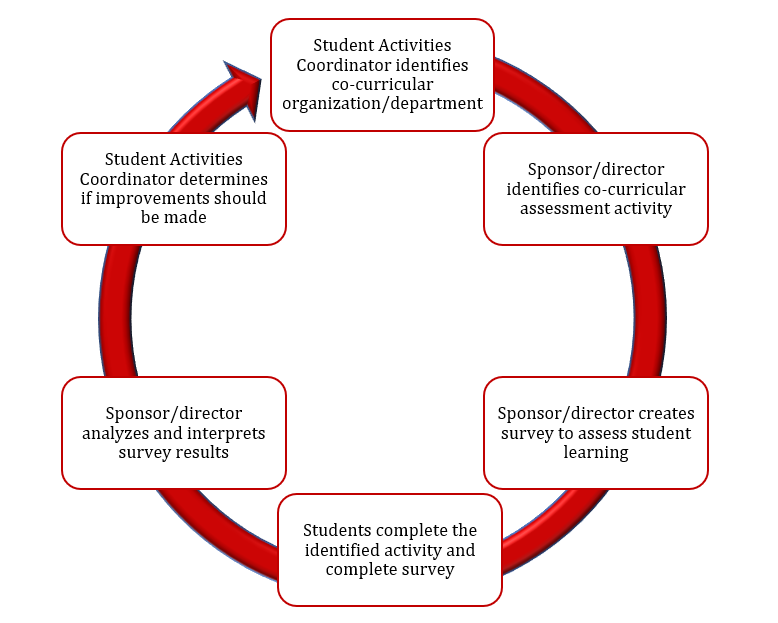
Co-Curricular Assessment Results
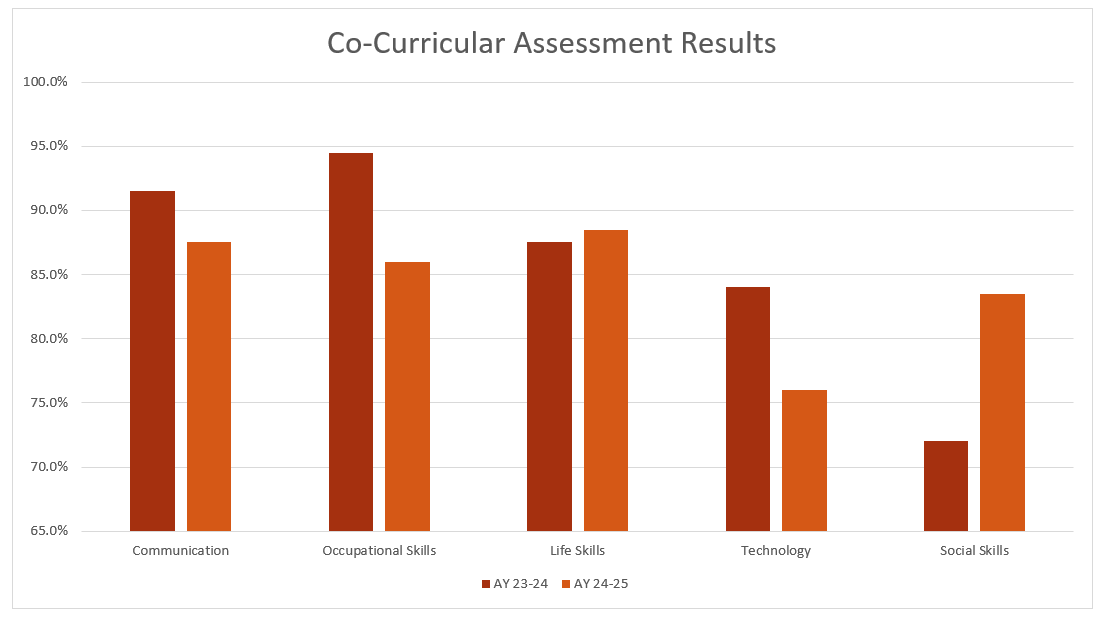
Explore UA Cossatot and let us help you find out how we can get you started, or help you continue, your educational journey. At UA Cossatot, if you start here, you can go anywhere!